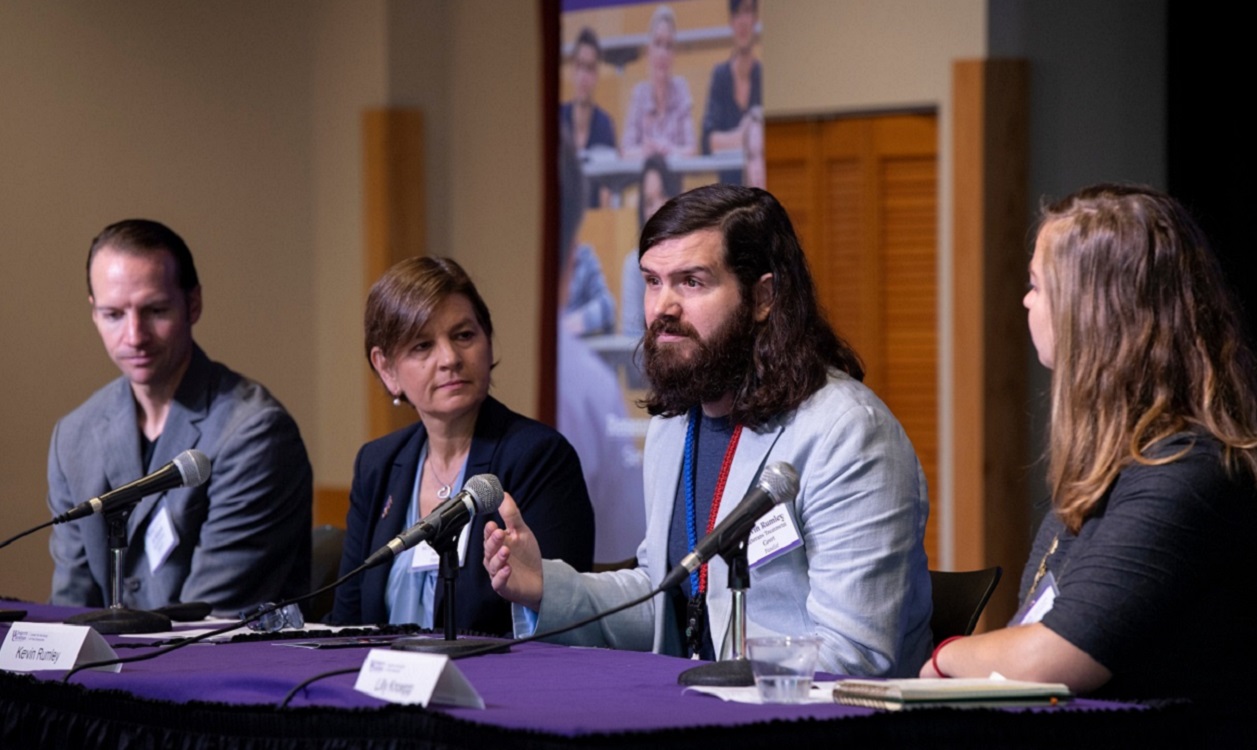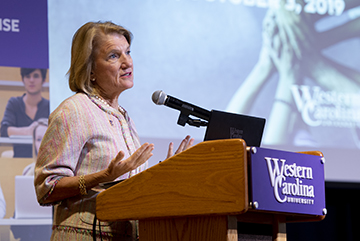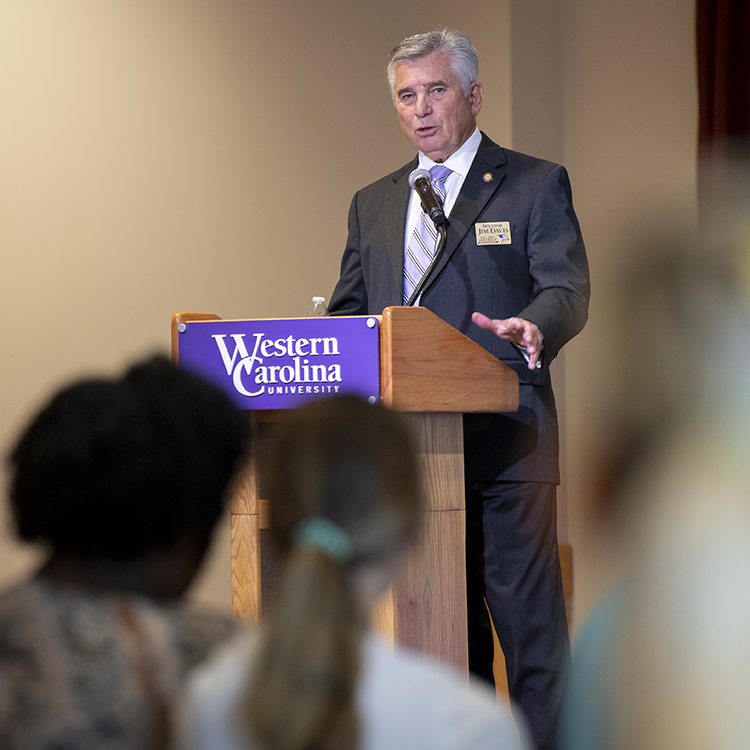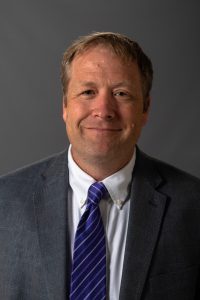Town hall on opioid and addiction crisis opens doors to potential solutions

From left, Al Kopak, WCU associate professor of criminology and criminal justice, and Holly Jones, community partnerships and outreach coordinator with the N.C. Department of Justice, listen to WCU alumnus Kevin Rumley, coordinator for the Buncombe County Veterans Treatment Court, along with moderator Lilly Knoepp of Blue Ridge Public Radio.
A regional problem calls for a regional solution, Western Carolina University Chancellor Kelli R. Brown said in her opening remarks at an opioid and addiction town hall hosted by WCU on Thursday, Oct. 3.
The immediately recognizable fact is that Western North Carolina is under siege by substance abuse, with mountain counties facing escalating numbers of overdose deaths, overburdened jails and increasing demands on social services, event organizers said. Opioids are a class of drugs that include heroin, fentanyl and prescription pain relievers such as oxycodone, hydrocodone, codeine and morphine.
As a regional, comprehensive university, Brown said WCU “must collaborate on important matters, including economic development, work force enhancement and social issues” ― including drug abuse.
“Through our faculty experts, we also take a seat at that table, supplying workable ideas, public awareness and education,” she said during introductory remarks to town hall attendees at A.K. Hinds University Center. “You’ll be hearing from people who are at the front lines of the opioid crisis, including an Iraq war veteran who is himself in long-term recovery from opioid addiction. You will hear from faculty members who have studied the opioid and addiction crisis from the perspectives of criminology and criminal justice, nursing, economics and social work.

U.S. Sen. Shelley Moore Capito
“As many of you may know, I have a background in public health. Opioid abuse and addiction is a major public health problem in the United States, and Western North Carolina is not immune from this problem,” Brown said. “I am proud that Western Carolina University has convened this regional town hall in an effort to identify tangible solutions to this epidemic.”
The town hall, with panel discussions, speakers and a breakout session, was a partnership between WCU’s Center for the Study of Free Enterprise and the Jackson County Community Foundation, which launched a monthlong opioid and addiction awareness campaign in September leading up to the forum.
More than 200 people attended, including WCU faculty, staff and students, government officials, health professionals and health care advocates, law enforcement, journalists and community members.
“We want to do more than talk about the problem, or just recognize what a big problem it is,” said Edward Lopez, center director. “The purpose of this town hall is to develop tangible ideas for solutions, advocate for ways to alleviate the opioid crisis, and collaborate and provide leadership in moving forward.”
The monthlong lead-up to the town hall included the Jackson County Board of Commissioners passing a proclamation declaring September as “Opioid Awareness Month,” with the county health department sending an expert to speak at high school assemblies. Also, WCU’s Department of Social Work received a $1.35 million Opioid Workforce Expansion Program grant through the U.S. Health Resources and Services Administration for experiential training for students who are preparing to become behavioral health professionals, with a focus on opioid use disorder and other substance use disorders prevention, treatment and recovery services.
The breakout session tackled four topics:
- Assessment and Measurement:How can data-driven methods help better understand the nature of the problem and workable solutions for WNC?
- Treatment Modes:What combinations of treatment plans are best for each kind of addiction scenario?
- Public Policy:What federal, state and local policy changes will help in opioid treatment?
- Social Marketing:How can we improve awareness and understanding be improved across wide populations?
The opening session keynote speaker was U.S. Sen. Shelley Moore Capito (R-W.Va.), who highlighted the struggles of an impoverished Appalachian state in dealing with the highest rate of opioid abuse, deaths and related crime in the nation. The closing session keynote speaker was state Sen. Jim Davis (R-Macon), who represents Cherokee, Clay, Graham, Haywood, Jackson, Macon and Swain counties in the General Assembly. He told attendees legislative measures could help, but action from all stakeholders would produce the better outcome.

N.C. Sen. Jim Davis
Panel member Al Kopak, WCU associate professor of criminology and criminal justice, spoke about his studies in local jails of inmates with addictions, data recorded from incarcerated populations, and the opportunities for intervention and recovery at that stage of an individual’s life. Following the town hall, he expressed confidence the town hall was a good point of progress in addressing the opioid crisis.
“I left the event most impressed with the variety of new initiatives being started in our communities,” Kopak said. “From introducing medication-assisted-therapy in the Haywood County Jail to new programs in Macon County, everyone is working hard to realize positive changes. I see the stats as demonstrating needs, and I learned about the effort being put forth to address them. I left inspired and motivated to forge ahead.”
Lopez said the dialogue throughout the day was productive and showed the importance of a diversity of thought being brought together in an accessible format.
“The ideas for next steps are more abundant than resources to fund those steps,” Lopez said. “So, some kind of prioritization needs to happen. And, I think it’s important we all strive to use vocabulary that recognizes the gravity of substance use issues, while also treating people with respect.”
Lopez said take-aways included the need to avoid the unintended consequences of state and federal policies and to keep legal alternatives on the table, such as needle exchanges, and the need to track the performance of experimental treatment and prevention programs.
Examples of immediate actions to be taken by attendees, as determined by a post-event survey, included advising stakeholders in the legal community about available resources; sharing data collected by Kopak with the local public health department and opioid response team; and identifying atypical areas to provide outreach and education.
Future steps could be groups and individuals taking a more active role to implement policy changes, gaining funding to start a drug court in the seven westernmost counties, and aiding other counties in replicating successful treatment options and programs.
For more information, email csfe@wcu.edu.

